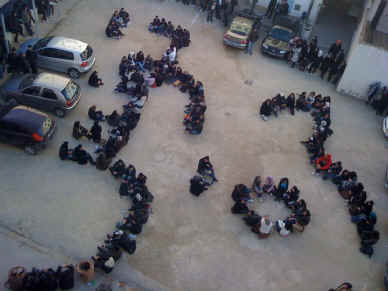
Where freedom of speech is not allowed, people still find ways to express their message. Students at an engineering institute in Tunis arranged themselves to spell out the words "tunus hurra" (Free Tunisia) on Monday. Schools and colleges in the capital had been surrounded by security forces to prevent students from demonstrating on the streets.
The Associated Press reports two days of clashes in Thala (western Tunisia, near the Algerian border):
As classes resumed after winter vacation Monday, hundreds of high school students and other protesters clashed with police, who used tear gas, said a union official who was present. The man spoke on condition of anonymity, fearing problems in a country where the media is heavily controlled by the state.
Amid the clashes, demonstrators set fire to tires and to the local ruling party headquarters on Monday, the official said. The unrest continued on Tuesday. Several people were arrested, and others were hospitalized with injuries, the union official said. The protests shuttered local schools.
France's LCI television broadcast video of Thala that showed packs of shouting young men roaming the streets and clouds of smoke in the air.
Al-Jazeera has a round-up of recent events here. It has also set up a special web page headed "Trouble in Tunisia" which compiles all its recent recent reports, along with an interactive map showing where the protests are occurring.
The nawaat blog continues to provide videos and reports of each day's events, and crowdvoice.org is compiling articles from a variety of sources.
The Reporters Without Borders website has good overview of the Tunisian government's intensified efforts to censor the internet. It says:
"Sensitive social and political topics were already heavily censored on the Internet but the authorities, who are clearly disturbed by this wave of unrest, have responded by trying to impose even tighter and faster controls over the online flow of information about it.
"However, in the internet era, it is becoming impossible to prevent coverage of events of this scale and censorship has perverse effects. All sorts of rumours circulate in the absence of reliable information. We urge the authorities to back off and to stop filtering websites and stop intimidating netizens and bloggers."
TUNISIAN JOKE doing the rounds on Twitter:
Q. How do you say "Imelda Marcos" in Arabic?
A. "Leila Trabelsi".
Posted by Brian Whitaker, 5 Jan 2011.

 RSS Feed
RSS Feed
